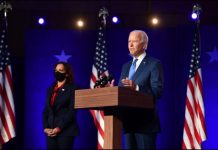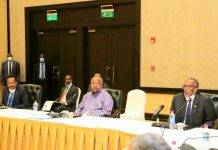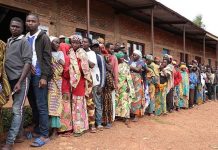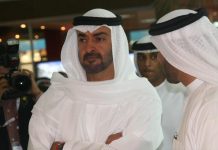By Liban Obsiye & Sakariye Hussein
The Government of President Farmaajo has clearly understood the importance of communication as a means of reaching out to and engaging with the Somali people. From the frantic and regular visits of the PM to key Government offices, the President’s personal visits to the regional member states and some individual Minister’s briefings to the media in their areas of primary responsibility, it is easy to see that public engagement and its communication has been prioritised by both the President and Prime Minister. More impressively, a multiplatform communication strategy is employed by the two principals which includes broadcast, social media and direct public interactions.
It is hard to forget the images of President Farmaajo enjoying a cup of tea in a café with locals or PM Hassan Khaire visiting Liido and speaking to traders and beachgoers. However, as successful as the media strategy has been thus far, especially, from the President and PM’s Office, there is still a long way to go to create a national narrative informed and led by the Government’s key priorities.
The enabling national narrative is one which unifies Government policies and strategies and is disseminated through multiple platforms to the Somali people for the purposes of education, information and gaining their full support throughout the policy making process.
What’s the message?
Both President Farmaajo and PM Khaire are truly ambitious in their proposed policy actions to transform Somalia. The two principals have made clear that anti-corruption, economic development, security and public services are their key priorities. To this end, much legislations, including an Anticorruption Bill, Public Financial Management Law and many more are scheduled to go before Parliament once it reconvenes in mid-July. Alongside the drafting of laws and policies, many of the relevant line Ministers and their officials are working hard behind the scenes to discuss and negotiate the proposed laws with key stakeholders, including Parliamentarians and the international community. More importantly, all proposed laws are now correctly channelled through the Ministry of Justice for review and analysis before they can be forwarded to Cabinet and, eventually, Parliament. From all this, it is clear that in under 4 months, this Government is making swift progress towards realising its key policy goals, at least through proposed legislations, whilst at the same time empowering the line Ministries by allowing them to take the lead. So, it is easy to conclude that the most appropriate message from all these actions is that the Government has clear priorities which are driven by the relevant institutions. Cross Government working, delegated responsibilities and agreed priorities? Great news. But just one issue: where is the stakeholder input and outreach?
Educate the public
The Somali people are the most important stakeholders in the Somali Government’s reform agenda as they are the intended and rightful primary beneficiaries. The Somali Government exists to serve its deserving and resilient people. Therefore, for any policy to be truly successful and gain wider public support necessary, the relevant line Minister’s must share their ideas and policy’s content with the Somali people. Of course, it is not possible to ask each citizen their view but on issues like tackling corruption, public services and economic development, which will no doubt involve tax collection from them, the people must be provided as much information as possible through the best media platforms. What? When? Where? Who? How? Why? These are the basics questions related to communicating change and all must be explained thoroughly to engage the public effectively.
The information sharing, gathering and listening and learning exercise involved in public consultation should be led by the relevant Minister’s to win public support for the relevant policies. This is the only way it will ever enjoy a smoother ride through parliament and it can enlighten the public about the reforms and their implementation strategies and time lines. The main advantage of this type of direct engagement is that it presents a picture of a unified Government, at one with itself and its people, represented by diverse characters all working in the public interest. Furthermore, it puts a responsible face to key policies and decisions which should encourage ownership, accountability and effective action on the part of Minister’s and the Ministries they lead.
In all fairness, some of the above has already started with the likes of Dr. Abdirahman Beileh, the Minister of Finance and Abdirahman Omar Osman (aka Eng. Yarisow), the Minister of Information, providing regular updates to the Somali people on key policy issues that concern their Ministries through traditional and social media. However, what is needed is a systemic review of Government priorities and a communication strategy with agreed timelines for implementation which reflects this. At present, there are many single standalone activities and actions led by the President and PM’s Offices as well as line Ministries, which cannot easily be related back to the main policy priorities the communication strategy ought to be reflecting and reinforcing.
Priority within priorities
There is no doubt that the Somali Government’s agenda of tackling corruption, boosting economic development, providing public services and strengthening security and, thereby, increasing public and private confidence in their country is crucial. The Government deserves praise and support for the clarity of their policy goals but even with the greatest clarity, the current actions towards achieving them must be better communicated to all stakeholders and in order of priority. It is no longer enough to take laws to the Cabinet, Parliament and, when they are accepted, just to put it on the shelf as used to happen in the past. Laws and policies that serve the public interest must be effectively implemented as a matter of urgency to fulfil their original objectives. However, without prioritisation and wider public outreach and support, this will not be possible. By engaging the public directly with the agreed and implementable priorities, the Somali Government can capitalise on its strong public goodwill to make enabling reforms possible regardless of current and looming obstacles.
Changing the narrative
As mentioned earlier, the new administration led by President Farmaajo and overseen by PM Khaire is slowly getting the protocols of work right by dividing the priority tasks among the relevant Ministries and holding them to account for their review, amendments, drafting and eventual implementation. This promotes institution building and strengthens collaboration through trust and buy-in. This is clearly a step in the right direction which, reinforced by strong commitments to key policy priorities, will most certainly, if implemented successfully, transform Somalia for the better and in doing so, change the public and international narrative on the prospects of the country. Now, given what is at stake, the Somali Government must devise and endorse a Government wide strategy to communicate with all its stakeholders as a single unit unified by well-defined common policy objectives.
In Somalia, media and communication professionals are still misunderstood and often, undermined. Even those working at the heart of Government can sometimes struggle to convince their political bosses to work with them promoting their good work to stakeholders. From experience, there has never been a politician that has shunned the limelight, especially, when given the real opportunity to shine. So, it falls to the media professionals to lead the politicians and technocrats to understand the value of adopting and contributing to a national communication strategy and action plan. Although at present every Ministry appears to have a communications Director and spokesperson, the sector can truly benefit from organisation and leadership. Only when this occurs can the bigger issues of clear communicable themes, common hashtags and crisis management strategies be realistically discussed at the national level with regards to the Government’s key priorities.
In writing this article, we are cognizant of the significant effort undertaken by Minister Eng. Yarisow in his many roles in the past to coordinate media professional’s actions and provide information of the Government’s weekly activities to all stakeholders. This continues to this day but must be scaled up and extended to covering all of Somalia to support the Federalism processes. Furthermore, in the absence of an official Government Communications Department/Service, an official media professionals network must be formed in the same way as in the past under the leadership of the Ministry of Information, with Minister Eng. Yarisow as lead, which should set out the conditions for membership to promote the networks professionalism and credibility.
The long road ahead
Having successfully seen off the first 100 days, Somalia’s Government has some successes to be proud of and share with its citizens and the wider world. Somalia is progressing and it is likely that this positive momentum will continue. However, there are over 1000 plus days left which will require greater internal partnership, resources and management to ensure the policy priorities successful transformation from mere ideas to implemented and positive life changers. While the Somali people are tired of talk and false dawns, they are ready to be informed of, contribute to and be led to a better future by their Government. Therefore, it is now time for lights, camera (tweets, facebook) and action!
Liban Obsiye is the Chief Policy Coordinator at the Ministry of Finance. He was a senior adviser to the Somali Foreign Minister from March 2014-March 2017. He can be reached through the below:
libanbakaa@hotmail.com & @Libanobsiye (twitter)
Sakariye Yusuf Hussein is a member of the Senior Management team of Global Somali Diaspora (GSD). He can be reached through the below:
Sakariya100@hotmail.co.uk & @Iamzakariye (twitter)




























